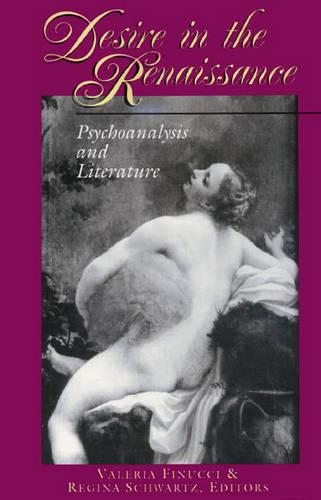
Desire in the Renaissance: Psychoanalysis and Literature
(Paperback)
Publishing Details
Desire in the Renaissance: Psychoanalysis and Literature
By (Author) Valeria Finucci
Edited by Regina Schwartz
Princeton University Press
Princeton University Press
16th January 1995
United States
Classifications
Professional and Scholarly
Non Fiction
Literary theory
Literary studies: general
Psychoanalytical and Freudian psychology
801.92
Physical Properties
Paperback
272
Width 197mm, Height 254mm
397g
Description
Drawing on a variety of psychoanalytic approaches, ten critics engage in exciting discussions of the ways the "inner life" is depicted in the Renaissance and the ways it is shown to interact with the "external" social and economic spheres. Spurred by the rise of capitalism and the nuclear family, Renaissance anxieties over changes in identity emerged in the period's unconscious--or, as Freud would have it, in its literature. Hence, much of Renaissance literature represents themes that have been prominent in the discourse of psychoanalysis: mistaken identity, incest, voyeurism, mourning, and the uncanny. The essays in this volume range from Spenser and Milton to Machiavelli and Ariosto, and focus on the fluidity of gender, the economics of sexual and sibling rivalry, the power of the visual, and the cultural echoes of the uncanny. The discussion of each topic highlights language as the medium of desire, transgression, or oppression. The section "Faking It: Sex, Class, and Gender Mobility" contains essays by Marjorie Garber (Middleton), Natasha Korda (Castiglione), and Valeria Finucci (Ariosto).The contributors to "Ogling: The Circulation of Power" include Harry Berger (Spenser), Lynn Enterline (Petrarch), and Regina Schwartz (Milton). "Loving and Loathing: The Economics of Subjection" includes Juliana Schiesari (Machia-velli) and William Kerrigan (Shakespeare). "Dreaming On: Uncanny Encounters" contains essays by Elizabeth J. Bellamy (Tasso) and David Lee Miller (Jonson).
Reviews
"Desire in the Renaissance is impressive in its range, and shows how comprehensive the use of psychoanalytic theory in literary criticism has become. At their best, the essays demonstrate the power of psychoanalysis to elucidate the convoluted workings of literary language, and argue for its peculiar compatibility with the dizzying gamesmanship of early modern texts."--Katy Emck, Times Literary Supplement
Author Bio
Valeria Finucci is Professor of Romance Studies and Regina Schwartz is Professor of English, both at Duke University.
